【初中英语语法 时态】动词—ing形式易错点集锦
必备英语中考英语现在进行时难点、易错点含答案解析
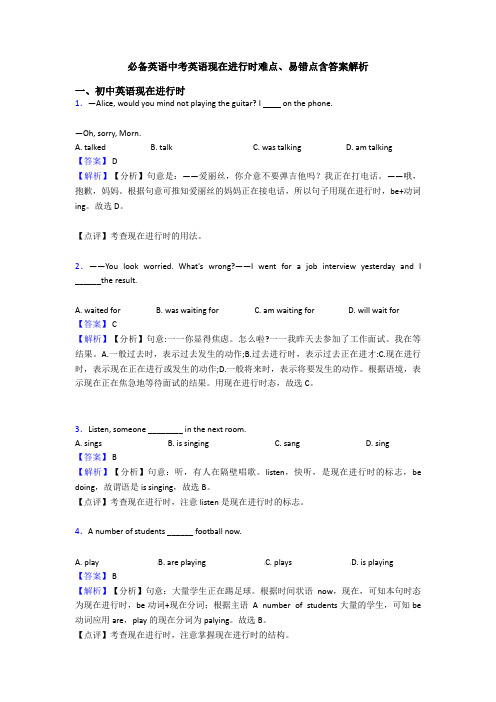
必备英语中考英语现在进行时难点、易错点含答案解析一、初中英语现在进行时1.—Alice, would you mind not playing the guitar? I on the phone.—Oh, sorry, Morn.A. talkedB. talkC. was talkingD. am talking【答案】 D【解析】【分析】句意是:——爱丽丝,你介意不要弹吉他吗?我正在打电话。
——哦,抱歉,妈妈。
根据句意可推知爱丽丝的妈妈正在接电话,所以句子用现在进行时,be+动词ing。
故选D。
【点评】考查现在进行时的用法。
2.——You look worried. What's wrong?——I went for a job interview yesterday and I ______the result.A. waited forB. was waiting forC. am waiting forD. will wait for【答案】 C【解析】【分析】句意:一一你显得焦虑。
怎么啦?一一我昨天去参加了工作面试。
我在等结果。
A.一般过去时,表示过去发生的动作;B.过去进行时,表示过去正在进才:C.现在进行时,表示现在正在进行或发生的动作;D.一般将来时,表示将要发生的动作。
根据语境,表示现在正在焦急地等待面试的结果。
用现在进行时态,故选C。
3.Listen, someone ________ in the next room.A. singsB. is singingC. sangD. sing【答案】 B【解析】【分析】句意:听,有人在隔壁唱歌。
listen,快听,是现在进行时的标志,be doing,故谓语是is singing,故选B。
【点评】考查现在进行时,注意listen是现在进行时的标志。
4.A number of students ______ football now.A. playB. are playingC. playsD. is playing【答案】 B【解析】【分析】句意:大量学生正在踢足球。
初中英语动词ing 用法小结
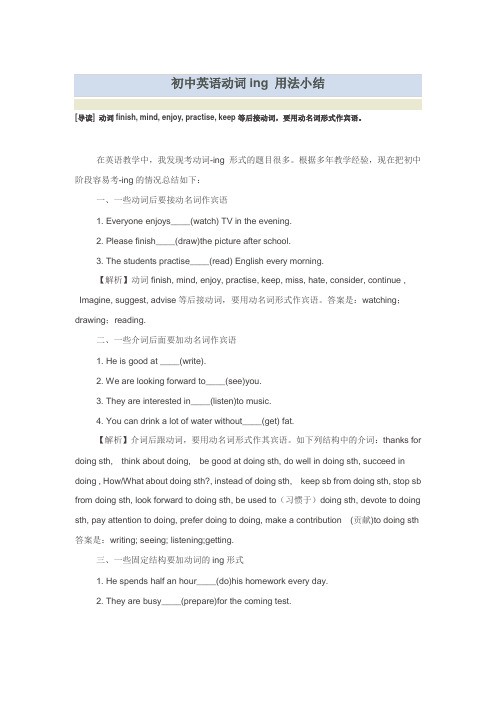
[导读] 动词finish, mind, enjoy, practise, keep等后接动词,要用动名词形式作宾语。
在英语教学中,我发现考动词-ing 形式的题目很多。
根据多年教学经验,现在把初中阶段容易考-ing的情况总结如下:一、一些动词后要接动名词作宾语1. Everyone enjoys____(watch) TV in the evening.2. Please finish____(draw)the picture after school.3. The students practise____(read) English every morning.【解析】动词finish, mind, enjoy, practise, keep, miss, hate, consider, continue , Imagine, suggest, advise等后接动词,要用动名词形式作宾语。
答案是:watching;drawing;reading.二、一些介词后面要加动名词作宾语1. He is good at ____(write).2. We are looking forward to____(see)you.3. They are interested in____(listen)to music.4. You can drink a lot of water without____(get) fat.【解析】介词后跟动词,要用动名词形式作其宾语。
如下列结构中的介词:thanks for doing sth, think about doing, be good at doing sth, do well in doing sth, succeed in doing , How/What about doing sth?, instead of doing sth, keep sb from doing sth, stop sb from doing sth, look forward to doing sth, be used to(习惯于)doing sth, devote to doing sth, pay attention to doing, prefer doing to doing, make a contribution (贡献)to doing sth 答案是:writing; seeing; listening;getting.三、一些固定结构要加动词的ing形式1. He spends half an hour____(do)his homework every day.2. They are busy____(prepare)for the coming test.3. We have a great time____(talk)to each time at lunchtime.【解析】在一些固定结构中要求使用动词-ing形式。
初中英语语法易错点拨+动词时态
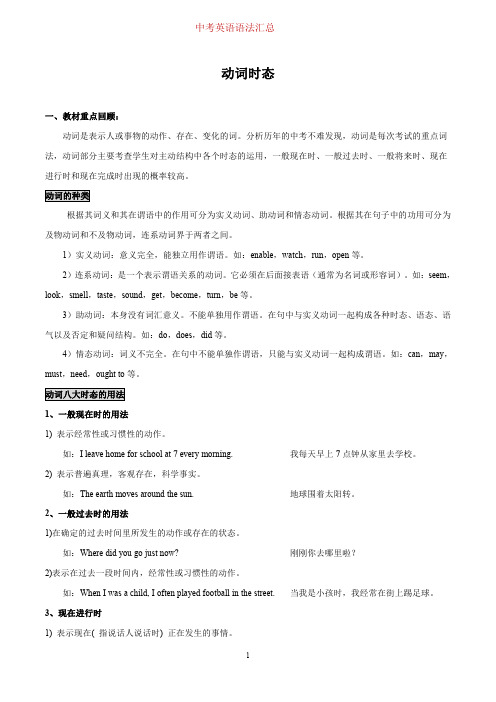
动词时态一、教材重点回顾:动词是表示人或事物的动作、存在、变化的词。
分析历年的中考不难发现,动词是每次考试的重点词法,动词部分主要考查学生对主动结构中各个时态的运用,一般现在时、一般过去时、一般将来时、现在进行时和现在完成时出现的概率较高。
动词的种类根据其词义和其在谓语中的作用可分为实义动词、助动词和情态动词。
根据其在句子中的功用可分为及物动词和不及物动词,连系动词界于两者之间。
1)实义动词:意义完全,能独立用作谓语。
如:enable,watch,run,open等。
2)连系动词:是一个表示谓语关系的动词。
它必须在后面接表语(通常为名词或形容词)。
如:seem,look,smell,taste,sound,get,become,turn,be等。
3)助动词:本身没有词汇意义。
不能单独用作谓语。
在句中与实义动词一起构成各种时态、语态、语气以及否定和疑问结构。
如:do,does,did等。
4)情态动词:词义不完全。
在句中不能单独作谓语,只能与实义动词一起构成谓语。
如:can,may,must,need,ought to等。
动词八大时态的用法1、一般现在时的用法1)表示经常性或习惯性的动作。
如:I leave home for school at7every morning.我每天早上7点钟从家里去学校。
2)表示普遍真理,客观存在,科学事实。
如:The earth moves around the sun.地球围着太阳转。
2、一般过去时的用法1)在确定的过去时间里所发生的动作或存在的状态。
如:Where did you go just now?刚刚你去哪里啦?2)表示在过去一段时间内,经常性或习惯性的动作。
如:When I was a child,I often played football in the street.当我是小孩时,我经常在街上踢足球。
3、现在进行时1)表示现在(指说话人说话时)正在发生的事情。
2021年中考英语语法---动词-ing形式知识点总结与整理
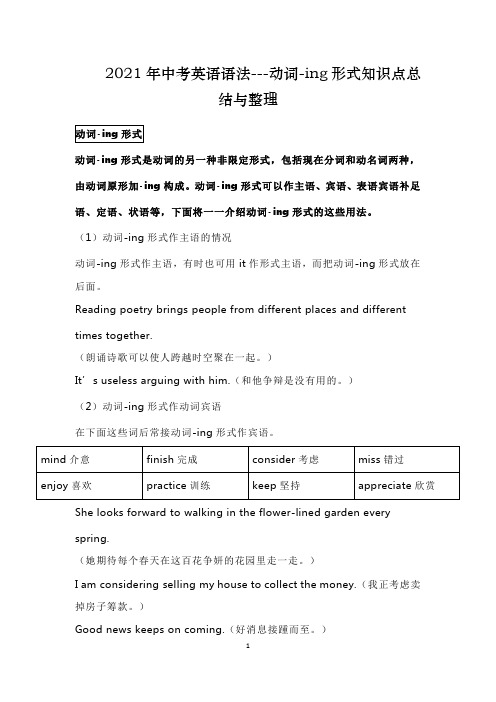
Having watered the vegetables (=After they had watered the vegetables),they went back home for breakfast.(他们浇过菜之后,就回家吃早饭了。
)B.动词-ing形式作状语表示原因Being so poor in those days (=As we were so poor in those days),we couldn’t afford to send the boy to the hospital.(由于那时太穷了,我们没有能力送孩子上医院。
)Having already seen the film twice (=As we had already seen the film twice),we didn’t go to the cinema.(因为这部电影我们已经看过两次了,所以我们没有去电影院。
)C.动词-ing形式作状语表示条件Standing on the top of the tower (=If we stand on the top of the tower),we can see as far as the Yangtze River.(如果我们站在塔顶上就能看到长江。
)D.动词-ing形式作状语表示自然而然的结果Her husband died in 1942,leaving five children with her (=and left five children with her).(1942年她丈夫死了,给她丢下5个孩子。
)E.动词-ing形式作状语表示伴随或补充说明Every evening they sat on the sofa watching TV (=and watched TV). (他们每天晚上坐在沙发上看电视。
)。
动词ing形式的用法及变化规则-ing形式
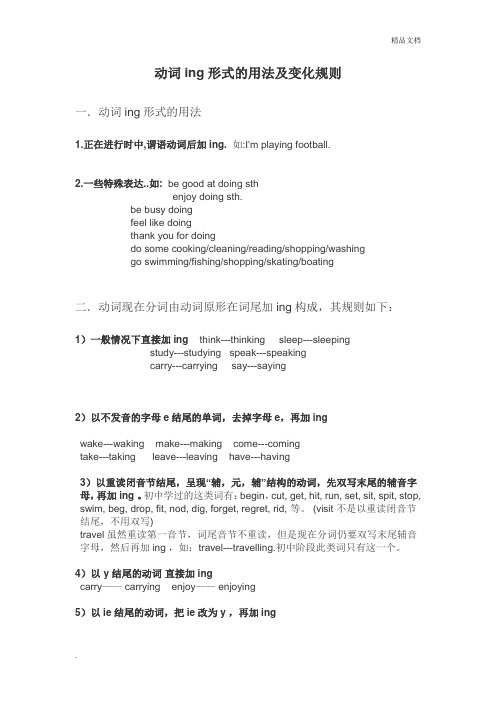
动词ing形式的用法及变化规则一.动词ing形式的用法1.正在进行时中,谓语动词后加ing. 如:I'm playing football.2.一些特殊表达..如: be good at doing sthenjoy doing sth.be busy doingfeel like doingthank you for doingdo some cooking/cleaning/reading/shopping/washinggo swimming/fishing/shopping/skating/boating二.动词现在分词由动词原形在词尾加ing构成,其规则如下:1)一般情况下直接加ing think---thinking sleep---sleepingstudy---studying speak---speakingcarry---carrying say---saying2)以不发音的字母e结尾的单词,去掉字母e,再加ingwake---waking make---making come---comingtake---taking leave---leaving have---having3)以重读闭音节结尾,呈现“辅,元,辅”结构的动词,先双写末尾的辅音字母,再加ing 。
初中学过的这类词有:begin,cut, get, hit, run, set, sit, spit, stop, swim, beg, drop, fit, nod, dig, forget, regret, rid, 等。
(visit 不是以重读闭音节结尾,不用双写)travel虽然重读第一音节,词尾音节不重读,但是现在分词仍要双写末尾辅音字母,然后再加ing ,如:travel---travelling.初中阶段此类词只有这一个。
4)以 y 结尾的动词直接加 ingcarry—— carrying enjoy—— enjoying5)以ie结尾的动词,把ie改为y ,再加ingdie---dying lie---lying要特别注意有些动词没有进行时态.1、表示状态、思想、感情和感觉的动词,如:see, hear, love, know, want, hope, think等,没有进行时态。
初中动词-ing形式(现在分词)的转换规则及常见动词的-ing形式及填空检测汇总(完整版)
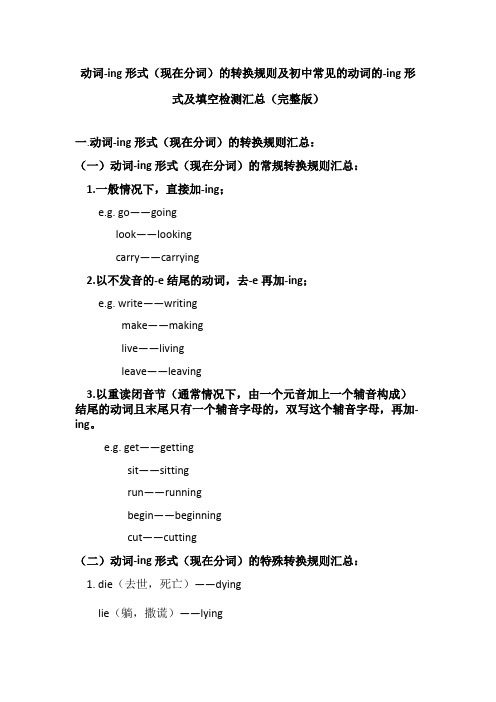
动词-ing形式(现在分词)的转换规则及初中常见的动词的-ing形式及填空检测汇总(完整版)一.动词-ing形式(现在分词)的转换规则汇总:(一)动词-ing形式(现在分词)的常规转换规则汇总:1.一般情况下,直接加-ing;e.g. go——goinglook——lookingcarry——carrying2.以不发音的-e结尾的动词,去-e再加-ing;e.g. write——writingmake——makinglive——livingleave——leaving3.以重读闭音节(通常情况下,由一个元音加上一个辅音构成)结尾的动词且末尾只有一个辅音字母的,双写这个辅音字母,再加-ing。
e.g. get——gettingsit——sittingrun——runningbegin——beginningcut——cutting(二)动词-ing形式(现在分词)的特殊转换规则汇总:1. die(去世,死亡)——dyinglie(躺,撒谎)——lyingtie(系)——tying2. picnic(野炊)——picnickingpanic(惊慌)——panicking3. listen(听)——listeningdevelop(发展)——developing4. agree(同意)——agreeingsee(看见,明白)——seeingflee(逃跑)——fleeing二.初中常考的动词的-ing形式(现在分词)汇总:change(改变)——changingshut(关闭)——shuttingsee(看见,明白)——seeinggive(给,给予)——givingcough(咳嗽)——coughingbase(依据)——basingspeak(说)——speakingmeet(遇见)——meetingmake(制作)——makingknow(知道)——knowinggo(去)——goingtake(带去)——takingride(骑行)——ridingcontinue(继续)——continuing laugh(大笑)——laughingshock(震惊)——shockingtrap(困住)——trappingreach(到达,触碰)——reaching read(阅读)——readinghope(希望)——hopingjudge(判断)——judgingdraw(画画,拖)——drawing frighten(恐吓,惊吓)——frightening wash(洗)——washingsteal(偷)——stealingfall(降落,下降)——fallingeat(吃)——eatinghear(听)——hearingeducate(教育)——educating become(变成)——becomingcome(来)——comingcare(关注)——caringtell(告诉)——tellingfight(打架,战斗)——fightingsentence(审判)——sentencing decorate(装饰)——decoratingcry(哭)——cryingexamine(检查)——examining design(设计)——designing praise(赞扬)——praisinglive(居住)——livinghold(持有,握住)——holding compete(竞争)——completing replace(取代)——replacingfeel(感觉)——feelingsay(说)——sayingmark(标记)——markingserve(服务)——servingsell(销售,卖)——sellingdecide(决定)——decidingtry(尝试,努力)——tryinghit(击打)——hittingput(放)——puttingconsist(组成,构成)——consisting arise(出现)——arisingwatch(观看)——watchingappear(出现,露面)——appearing solve(解决)——solvingconnect(连接)——connectinguse(使用)——usingrebuild(重建)——rebuilding question(询问)——questioningask(问)——askingpaint(涂,绘画)——paintingtype(打印)——typingfinish(完成)——finishingheat(加热)——beatinglose(失去)——losingleave(离开)——leavingexpect(期待,预料)——expecting write(写)——writinghunt(打猎)——huntingattract(吸引)——attractinginvite(邀请)——invitingdream(梦想)——dreamingcall(打电话)——callingcelebrate(庆祝)——celebrating depend(依赖,依靠)——dependingbelieve(相信)——believingchat(闲聊)——chattinglearn(学习)—— learningpermit(允许)——permitting admit(承认,录取)——admitting apologize(道歉)——apologizing breathe(呼吸)——breathingset(设置)——settingsatisfy(满意)——satisfying forget(忘记)——forgettingget(得到)——gettingbalance(平衡)——balancing wait(等待)——waitingrepair(修理)——repairingclean(打扫)——cleaning combine(联合)——combining frustrate(沮丧)——frustratinglie(说谎,躺)——lyingfind(找到,发现)——finding puzzle(使困惑)——puzzling develop(发展)——developing follow(跟随,追随)——followingpass(通过)——passingstop(阻止,停止)——stopping help(帮助)——helpingterrify(害怕)——terrifying confirm(证实)——confirmingcut(切,砍)——cuttinglisten(听)——listeningrise(上升)——risinglock(锁住,关闭)——locking scream(尖叫)——screaming reserve(保存,保留)——reserving carry(携带)——carryingspot(发现)——spottingplease(请求)——pleasingintend(打算,旨在)——intending move(移动)——movinghave(上课)——havinglive(居住)——livinginspire(鼓舞,鼓励)——inspiring respect(尊重)——respecting argue(争论)——arguingkeep(保持)——keepingmean(意味着,打算)——meaning catch(抓住,赶上)——catching start(开始)——startingbegin(开始)——beginningleave(离开)——leavingpersuade(说服)——persuading bring(带来)——bringingpost(邮寄)——postingburn(晒伤,燃烧)——burning excite (使兴奋)——exciting interest(感兴趣)——interesting surprise(吃惊,惊讶)——surprising amaze(惊奇)——amazinglead(引导)——leadingequip(装备)——equippingdisturb(打扰)——disturbing occupy(占,忙于)——occupying spend(花费,度过)——spending miss(思念,错过)——missing discover(发现)——discoveringteach(教)——teachinggrow(称重)——growingproduce(生产)——producing damage(毁坏)——damagingrun(跑步,运行)——runningwear(穿,戴)——wearingpoint(指出)——pointingbuy(购买)——buyingbore(厌烦)——boringtouch(接触)——touchinghappen(发生,碰巧)——happening explain(解释,说明)——explaining rescue(拯救)——rescuing remember(记住)——remembering stand(站立,忍受)——standing stare(盯着)——staringfly(飞)——flyingarrive(到达)——arrivingdefend(防卫)——defendingnod(点头)——noddingrefuse(拒绝)——refusinghide(隐藏)——hidingadvance(前进)——advancingguide(指导)——guidingbreak(打破)——breakingdivide(分开)——dividinginjure(受伤)——injuringsunburn(晒伤)——sunburningpromote(促进,提升)——promoting infect(感染)——infectingbury(埋)——buryingexpose(暴露)——exposingabsorb(吸收,专注)——absorbinglink(连接)——linkingdie(死亡,去世)——dyingcheck(核对,检查)——checkingremind(提醒)——remindingsleep(睡觉)——sleepingunderstand(理解,明白)——understanding mind(介意)——mindingsing(唱歌)——singingsettle(定居,解决)——settlingshout(大叫)——shoutingadvertise(做广告)——advertisingdeliver(接送)——deliveringquarrel(争吵)——quarrelingdescribe(描述)——describingbuild(建立)——buildingheat(加热)——heatingencourage(鼓励)——encouragingwarn(警告)——warningrecord(记录)——recordingfail(失败)——failingcontrol(控制)——controllingstick(坚持,粘贴)——stickingapply(运用,敷)——applyingchoose(选择)——choosingweep(哭泣)——weepingpanic (恐慌)——panickingleap(跳跃)——leapingundertake(从事)——undertaking三.初中常考的动词的-ing形式(现在分词)填空检测汇总:change——_________shut——______see——______cough——_______ base——________ speak——_______ meet——______ make——________ know——_______ go——_______ take——________ ride——_______ continue——________ laugh——________ shock——_______ trap——________ reach——_______ read——______ hope——_________ judge——__________ draw——_______ frighten——________ wash——________ steal——_______eat——_______ hear——_______ educate——________ become——________ come——______ care——_______ tell——______ bear——______ fight——________ sentence——________ decorate——_______ cry——________ examine——________ design——_________ praise——________ live——________ hold——_______ compete——________ replace——________ feel——_______ say——______serve——________ sell——________ decide——_________ try——_______ hit——_____ put——______ consist——________ arise——_______ watch——________ appear——________ solve——______ connect——_______ use——_______ rebuild——_______ question——________ ask——________ paint——__________ type——_______ finish——________ heat——_______ lose——______expect——_______ bite——______ write——_______ hunt——________ rub——________ attract ——_________ invite——_______ dream——__________ call——________ celebrate——__________ depend——__________ believe——_________ chat——_______ learn——_________ permit——_______ admit——________ apologize——________ breathe——_________ set——_______ satisfy——_________ forget——_________balance——__________ wait——_______ repair——_________ clean——________ combine——________ frustrate——________ lie——_______ find——_______ puzzle——_______ develop——_________ follow——_________ surround——_________ pass——_______ stop——_______ help——_______ terrify——_______ confirm——________ cut——_____ listen——________ rise——_______ lock——_______reserve——__________ carry——________ spot——_________ please——________ intend——_________ move——________ have——_______ live——_______ inspire——________ respect——________ argue——________ study——__________ keep——_______ mean——________ catch——________ start——_________ begin——_________ leave——_______ persuade——__________ bring——_________ post——________excite ——_________ interest——_____________ surprise——__________ amaze——________ lead——_______ equip——_________ disturb——_________ occupy——__________ spend——_________ miss——________ discover——_________ teach——________ grow——________ produce——__________ damage——___________ run——________ wear——_______ point——________ buy——________ bore——_______ touch——________explain——__________ rescue——________ remember——___________ stand——________ stare——______fly——_______ arrive——________ defend——________ nod——________ refuse——________ hide——________ advance——__________ guide——________ break——_________ divide——_______ injure——_______ sunburn——__________ promote——__________ infect——___________ bury——__________ expose——_________absorb——___________ link——_________ die——_______ check——_______ remind——________ sleep——________ understand——_________ mind——________ sing——_______ settle——_________ shout——________ advertise——___________ deliver——__________ quarrel——___________ describe——__________ build——________ heat——_______ encourage——__________ warn——__________ record——__________ fail——________ control——_______stick——________ apply——________ choose——__________ weep——________ panic ——________ leap——________ undertake——________。
(英语)初中英语现在进行时易错剖析

(英语)初中英语现在进行时易错剖析一、初中英语现在进行时1.Listen! The little girl singing in the room.A. areB. amC. isD. was【答案】 C【解析】【分析】句意:听!小女孩在房间里唱歌。
根据提示词look,看,可知谓语动词要用现在进行时,am/is/are+现在分词,主语the little girl,第三人称单数,要用is,故选C。
【点评】考查现在进行时的构成和用法。
注意主语与谓语在人称和数上一致。
2.The sports meeting in our school now.A. being heldB. is havingC. is holdingD. is being held【答案】 D【解析】【分析】句意:在我们学校运动会正在被举行。
“be+being +动词的过去分词” 是现在进行时态的被动句的结构。
所以选D。
【点评】考查现在进行时的被动语态。
3.We're proud that China _________ stronger and stronger these years.A. will becomeB. becameC. is becomingD. was becoming【答案】 C【解析】【分析】句意:我们很骄傲这些年中国变得越来越强大。
A. will become一般将来时,表示将要发生的动作; B. became是一般过去时,表示过去发生的动作;C. is becoming现在进行时,表示正在发生的动作;D. was becoming过去进行时,表示过去某个时间(或时间段内)正在发生的动作。
根据these years可知,这里表示动作正在发生。
故选C。
4.Look! Some visitors _________ for the bus over there.A. are waitingB. is waitingC. waitingD. wait【答案】A【解析】【分析】句意:看,一些参观者正在那边等公共汽车。
现在进行时易错

(1)误:They are swiming (swim) .正: They are swimming (swim).(2)误:Jenny is plaiing (play) football.正: Jenny is playing (play) football.解析: A、动词变现在分词可有如下口诀 :一般-ing;哑 e 先去 e;重闭单辅先双写;-ie 结尾 y 来替。
B、动词现在分词的变化规则要与名词变复数、动词变现单三等规则区分开来。
(1)误: Look! Two children flying (fly) a kite in the park.正: Look!Two children are flying (fly) a kite in the park.(2)误: Li Ming isn't read ( not read) a book in bed now.正: Li Ming isn't reading ( not read) a book in bed now.解析:现在进行时的谓语部分的构成是"be+现在分词" ,二者缺一不可,这一点必须要牢记。
The students are singing in the room.( 对划线部分提问)→误: What are the students in the room?→正: What are the students doing in the room?解析:现在进行时态中对动作提问可记住此句式"What +be +主语+doing+其它?" 或简写为"What......doing......? " 句式。
孩子们在跑还是在跳?误: Are the children running or jump?正: Are the children running or jumping?解析: or 连接的是两个并列成分,动词形式须一致。
第十三章动词-ing形式(思维导图+知识梳理+好题精炼)2022-2023初中英语中考语法归纳

第十三章动词-ing形式思维导图知识梳理一、动名词的定义动词-ing形式分为两类:动名词和现在分词.动名词在句中起名词作用,现在分词在句中起形容词或副词作用.动名词是一种动词的非谓语形式,它兼有动词和名词的特征,由动词原形加词尾-ing而成,其构成法与现在分词一样.动名词有时态和语态的变化.(以do为例)二、动词-ing 形式的句法作用从性质上讲,动词的-ing形式相当于名词、形容词、副词.因此,它在句中可用作主语、表语、定语、宾语、状语和宾语补足语.(一)作主语动词-ing形式作主语通常表示一种抽象的动作概念,即泛指某种行为或动作.Eating too much is bad for your health.吃得太多对身体健康有害.Is playing basketball after lunch good or bad for your health?吃完午饭就打篮球对身体健康有益还是有害?Travelling abroad can widen one's outlook.出国旅行会扩大人们的视野.点拨(1)动词-ing形式短语作主语,通常有两种位置:一是放在句首,如上述例句所示;一是用it作形式主语,而将-ing分词短语移到谓语部分之后,以避免句子结构头重脚轻.Having his brother here will make him happier.It will make him happier having his brother here.让他的兄弟待在这里将会使他高兴一些.Swimming in this river is dangerous.It is dangerous swimming in this river.在这条河中游泳很危险.(2)动词-ing形式作主语还可以用于“There is no+-ing形式”(····是不可能的)结构.There is no smoking here.这里不许吸烟.There is no joking about such matters.这件事开不得玩笑.(二)作表语动词-ing形式(短语)作表语有时起名词作用,泛指动作,有时起形容词作用,指主语的性质、状态.His hobby is collecting stamps.他的爱好是集邮.The news is exciting.这消息令人兴奋.The food smells inviting.这道菜香味怡人.My favourite sport is playing table tennis.我最喜欢的运动是乒乓球.The only thing she is interested in is dancing.她唯一感兴趣的就是跳舞.点拨不要把作表语的-ing形式与进行时态相混淆.-ing形式作表语表示主语的某种特征,而进行时态则表示正在进行的动作.试比较:Her job is teaching.她的工作是教书.(teaching是表语)She is teaching there now.她正在那儿上课.(is teaching是现在进行时态)(三)作定语动词-ing形式作定语只表明它所修饰的词的用途、所属关系等,置于被修饰词之前.a working method 工作方法 a dining car 餐车a swimming pool 游泳池building materials 建材(四)作宾语在某些动词:suggest, finish, avoid, stop, can't help, mind(在乎),admit, advise,consider, deny, enjoy, require, postpone, delay, practise, fancy, excuse, pardon, miss(错过)等后面不能用不定式,而必须用动名词作为宾语.I can't help laughing.我禁不住笑了起来.Return the book to the library as soon as you finish reading it.你一看完这本书就还回图书馆.He enjoys watching TV plays.他喜欢看电视剧.点拨有些动词后既可用动名词,也可用不定式.在动词love, like, begin, start, continue等后,既可用动名词作宾语,也可用不定式作宾语,有时两种结构的意义差别不大.(五)作宾语补足语动词的-ing形式用作宾语补足语,常用在:see, hear, notice, watch, keep, find, feel, get, have等动词之后,与一个名词或代词构成复合宾语;其中宾语和宾语补足语是主谓关系.I saw him walking across the street.我看见他穿过街道.He kept me waiting for a long time.他让我等了很长时间.We watched the army marching down the street towards the park.我们观看部队沿街道朝公园行走.I heard her playing the piano.我听见她在弹钢琴.点拨在see, hear, feel, watch, notice等动词之后,既可用动词-ing形式也可用(不带to的)动词不定式作宾语补足语:如用动词-ing形式,通常表示动作正在进行;用动词不定式,则表示(或强调)动作从开始到结束的全过程.(六)作状语动词的-ing形式短语作状语时,通常都表示主语正在进行的另一动作,用来对谓语动词表示的动作加以修饰或作为陪衬,它可表示时间、原因、结果、条件、让步、方式或伴随动作,相当于相对应的状语从句.Seeing the teacher entering the room, the students stood up. =When the students saw the teacher entering the room, they stood up.学生(们)看见老师进房间,都站了起来.(两个动作同时发生)Being ill, I went home.=Because I was ill, I went home.由于生病,我回家了.The snow lasted a week, resulting in a serious traffic confusion in the whole area.=The snow lasted a week, so it resulted in a serious traffic confusion in the whole area.雪下了一个星期,造成整个地方的严重交通混乱.Be careful when crossing the street.过马路时,要小心.The students walked out of the classroom, laughing and talking.学生们有说有笑走出教室.点拨动名词也可以和about, against, at, before, after, by, besides, for, from, in, on, upon, without等介词构成短语,作状语用.Without saying good-bye, she left him.未告别,她就离开了他.After reading the passage twice, he began to do the exercises.这段文章看了两遍后,他就开始做练习了.Upon returning from Beijing, he went to visit his friend.从北京一回来,他马上就去拜访朋友.三、-ing分词的否定式-ing分词是动词的一种非限定形式,其否定式是一律在其前面加否定词“not”或“never”构成.如:I think it will do you a lot of good not going.我觉得不去对你会有好处的.I left at noon, not staying for lunch.我是中午走的,没有留下来吃午饭.I'm sorry for not having informed you of the meeting.抱歉没通知你开会.I regret not having gone together with her.我后悔没有跟她一起去.四、-ing分词常用于下列句型中It's no use... It's no good...Having difficulty/ trouble... There is no...It's no use doing experiments but not considering the results.不考虑结果做实验没有用.It's no good not combining theory with practice.不把理论和实践结合就没有用.I have trouble running a long distance.我跑长跑有困难.There is no denying the fact that we are still backward.不容否认,我们仍然落后.五、动名词的独立主格结构-ing分词也可以用于独立主格结构,由“主格名词或代词+-ing分词”构成,表示时间、条件、原因、伴随情况等.The clock striking eight, they began working.时钟敲了8响,他们就开始工作了.(表示时间)The weather being fine, we went for a walk.由于天气好,我们出去散散步.(表示原因)Time permitting, we'll come to see you. 如果时间允许,我们就来看你.(表示条件)也可由“with/without+宾语+-ing分词”构成独立主格结构,表示伴随情况.如:You must not sit with your feet pointing at another person.坐着时不要把脚朝着别人.六、动名词作宾语和动词不定式作宾语含义不同部分动词可加动名词作宾语,也可加动词不定式作宾语,但意思不同,如:(一)remember doing sth.表示“记得过去做过的一件事”,remember to do sth.表示“记得要去做某事”I remember seeing him once somewhere.我记得在哪里见过他一次.Remember to see him before he goes away.记住在他离开之前看他.(二)regret doing sth.表示“对过去做过的事情后悔”,regret to do sth.表示“对还没做或将要做的事情表示遗憾”I regret telling you the bad news.我后悔把这个坏消息告诉你.I regret to say I'm unable to help you.很抱歉我不能帮助你.(三)stop doing sth.表示“停止正在做的事情”,stop to do sth.表示“停止什么,然后去做另一件事情”Let's stop talking about it.咱们停止谈论这件事情吧.We stopped to see what happened.我们停下来去看发生了什么事情.(四)forget doing sth.表示“忘记曾做过某事”,forget to do sth.表示“忘记去做某事”I forgot giving the letter to her.我忘了,已经把信给她了.I forgot to post the letter.我忘记发信了.(五)try doing sth.表示“尝试着做某事”,try to do sth.表示“设法做某事”Let's try doing the work some other way.我们用别的方法做这工作试试.We must try to get everything done in time.我们必须设法及时把一切搞好.(六)mean doing sth.表示“意味着,意思是”,mean to do sth.表示“打算、想要”This means helping you.这意味着帮助你.I mean to help him with it.我打算帮助他做这件事情.七、一些与动词-ing 形式有关的短语(一)表示有目的、有意识地进行练习或训练某项技能:do+(some)+v.-ingdo some reading 读读书do some running跑跑步do some writing练练字This year I am going to do more speaking.今年我要多练口语.(二)表示做一些笼统、不具体指明的事:do+(some)+v.-ingdo some shopping 去商店买东西(不指明买哪样具体的东西)do some washing 洗东西do some cooking 做饭do some cleaning 扫除do some sewing 缝纫(三)“go+ v.-ing形式”大部分表示从事运动、消遣或娱乐活动go dancing 去跳舞go swimming去游泳go skating 去滑冰go skiing 去滑雪go shooting去射击go boating去划船go fishing去钓鱼go hunting去打猎go riding去骑马go walking去散步go running去跑步go sailing去航海八、-ing分词时态及语态(一)-ing分词的特点:-ing分词的时态分为一般式和完成式.一般式所表示的动作与谓语动词的动作往往同时发生.完成式所表示的动作发生在谓语动词的动作之前.He insisted on finishing the work before going home.他坚持在回家前一定要先完成工作.He didn't mention having met me.他没提及已见到了我.I still remember having ever worked together with him.我还记得曾经与他一起共过事.(二)-ing分词的语态-ing分词的被动语态也有一般式和完成式两种.The large house being built near the factory is a new hospital.工厂附近正在施工的大楼是一座新的医院.Having been sent to the wrong address, the letter did not reach her.那封信投错了地址,她没有收到.好题精练选择填空1.Taking pictures_________ very interesting.A. isB. areC. to beD. be2. _________ the bad news made him cry.A. HearB. HeardC. HearingD.Is hearing3. _________ a desert had always been a risk adventure.A. being crossed .Having crossed C. Crossing D. To have crossed4.Before he came, I'd finished_________ the whole book.A. to readB. to have readC. readingD. read5.I always enjoy_________ to popular music at night.A. to listenB. listeningC. that I can listenD. if I can listen6.We are considering_________ a trip around the island.A. takeB. to takeC. to be takingD. taking7.I hope you don't mind_________ at your newspaper.A.I lookB. my lookingC.I lookingD. my to look8.When a man's heart stops_________, he dies.A. to beatB. beating C .beat D. beaten9.I can't help_________ he is still alive.A. thinkingB. thinkC. to thinkD. thought of10.So far as I am concerned , I prefer readingA. than meatB. for joyC. instead of sleeping D to drinking11.It goes without_________ that knowledge is important.A. talkingB. tellingC. sayingD. mentioning12.we are looking forward_________ our friends next week.A .to see B. to seeing C. to be seeing D. shall see13.He spent a lot of money_________ books and magazines.A. buyB. buyingC. to buyD. bought14.The silkworm is an insect worth_________.A. to knowB. knowingC. to be knownD. being known15.She went out without_________ good-bye to us.A. sayB. to sayC. sayingD. being said16.The curious student kept on_________ questions.A. asksB. askingC. to askD. asked17.He is such a strange person; there's_________ what he'll do next.A. no knowingB. not to knowC. not knownD. being unknown18.When she heard the bad news, she burst_________.A. into cryingB. out to tearsC. cryingD. out crying19.You must never cross the street without_________ the light to turn green.A. waitingB. to waitC. waiting forD. to wait for20.Scientists succeed_________ protein out of old newspapers.A .to make B. at making C. making D. in making21.I became_________ after watching too much television.A. boredB. boringC. boreD. bores22.I felt_________ by his interest in my new invention.A. encourage B to encourage C. was encouraged D. encouraged23.He sat there_________ a novel.A. readB. readingC. readsD. had read24.Don't wake up the_________ child.A. sleepB. sleptC. sleepingD. sleepy25.A proverb goes:"A_________ stone gathers no moss”.A. rollB. rollingC. rolledD. rolls26.The heavy rain kept us_________ for two hours.A. waitB. waitedC. waitingD. to wait27.I found a dog_________ over by a car on the road.A. to run B .run C.ran D. running28.We found the baby_________ on the floor.A. sleptB. sleepC. asleepD. sleeping29.Jack saw a woman_________ near the dog, so he walked up to her.A. stoodB. standsC. to standD. standing30.They got their ca_________ at the garage.A. be washedB. washedC. being washedD. to have been washed 31_________ with his report, I told him to write it all over again.A. DissatisfactoryB. Not being satisfiedC. Having not satisfiedD. Dissatisfying32. _________ our shoes in our hands, we crossed the stream.A. To carryB. CarryingC. CarriedD. Carry33. _________ my homework, I went home.A. Having finishedB. FinishedC. Being finishedD. Finish34. _________ the door unlocked, I went in.A. FindingB. FoundC. Had foundD. Have found35. _________ a careless fellow, he forget all about it.A. IsB. BeC. BeingD. Was答案:1-5 ACCCB 6-10 DBBAD11-15 CBBBC 16-20 BADCD 21-25 ADBCB 26-30 CBCDB 31-35 BBAAC。
动词加ing形式英语语法知识点小结
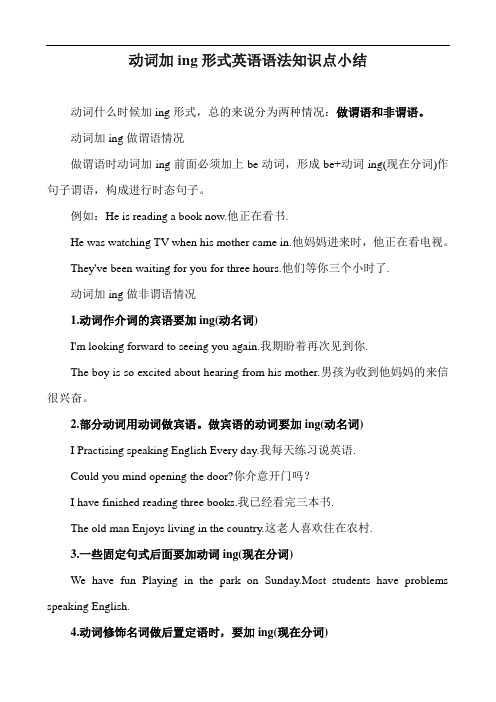
动词加ing形式英语语法知识点小结动词什么时候加ing形式,总的来说分为两种情况:做谓语和非谓语。
动词加ing做谓语情况做谓语时动词加ing前面必须加上be动词,形成be+动词ing(现在分词)作句子谓语,构成进行时态句子。
例如:He is reading a book now.他正在看书.He was watching TV when his mother came in.他妈妈进来时,他正在看电视。
They've been waiting for you for three hours.他们等你三个小时了.动词加ing做非谓语情况1.动词作介词的宾语要加ing(动名词)I'm looking forward to seeing you again.我期盼着再次见到你.The boy is so excited about hearing from his mother.男孩为收到他妈妈的来信很兴奋。
2.部分动词用动词做宾语。
做宾语的动词要加ing(动名词)I Practising speaking English Every day.我每天练习说英语.Could you mind opening the door?你介意开门吗?I have finished reading three books.我已经看完三本书.The old man Enjoys living in the country.这老人喜欢住在农村.3.一些固定句式后面要加动词ing(现在分词)We have fun Playing in the park on Sunday.Most students have problems speaking English.4.动词修饰名词做后置定语时,要加ing(现在分词)There is a boy Crying over there.I felt something moving in the house.I heard someone singing in the next room.5.动词做主语和表语时,动词要加ing(动名词)Swimming is very popular in summer.His job is teaching English.综上所述,动词在以上六种情况需要加ing!增强背诵记忆的方法• 勤动手指锻炼手指功能可健脑益智,促进思维。
有关ing知识点总结

有关ing知识点总结一、ing的基本用法ing是一个非常常见的词尾,在英语中用来构成动名词和现在分词。
动名词表示的是动作的持续性或正在进行性,常用来作主语、宾语或介词宾语。
现在分词是一种形容词,用来修饰名词或代词,表示状态或特征。
1. 动名词的构成动名词的构成规则是在动词原形的基础上加上-ing。
例如:read → reading,write → writing,study → studying。
2. 动名词的用法a. 主语:Reading is my favorite hobby.b. 宾语:I like reading books.c. 介词宾语:I am good at singing.3. 现在分词的构成现在分词的构成规则也是在动词原形的基础上加上-ing。
例如:play → playing,dance → dancing,swim → swimming。
4. 现在分词的用法a. 修饰名词:The crying baby needs attention.b. 修饰代词:I saw him running in the park.二、ing的时态用法ing形式的动词可以表示进行时或完成时,具体的时态和语态要根据上下文确定。
1. 进行时进行时表示某一动作或状态正在进行中,通常用于现在进行时和过去进行时。
a. 现在进行时:I am reading a book.b. 过去进行时:She was studying when I called her.2. 完成时完成时用于表示一个已经完成的动作或状态,通常用于现在完成进行时和过去完成进行时。
a. 现在完成进行时:She has been working here for 5 years.b. 过去完成进行时:I had been studying for 2 hours when he came back.三、ing的被动语态ing形式的动词也可以构成被动语态,形式为be + being + 过去分词。
动词ing形式六大易错点
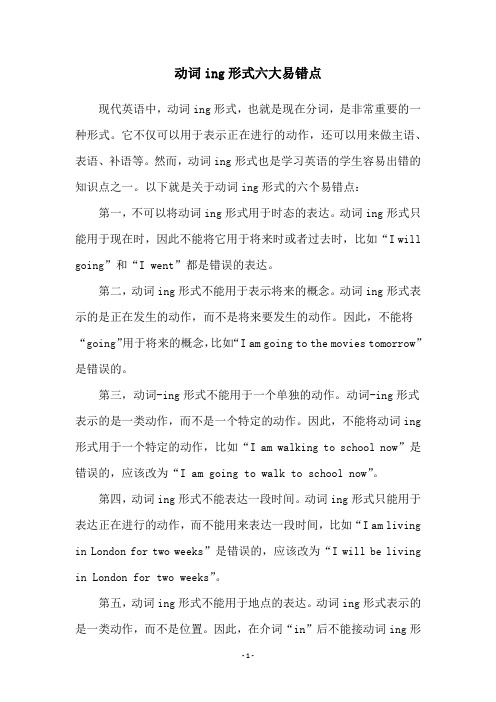
动词ing形式六大易错点现代英语中,动词ing形式,也就是现在分词,是非常重要的一种形式。
它不仅可以用于表示正在进行的动作,还可以用来做主语、表语、补语等。
然而,动词ing形式也是学习英语的学生容易出错的知识点之一。
以下就是关于动词ing形式的六个易错点:第一,不可以将动词ing形式用于时态的表达。
动词ing形式只能用于现在时,因此不能将它用于将来时或者过去时,比如“I will going”和“I went”都是错误的表达。
第二,动词ing形式不能用于表示将来的概念。
动词ing形式表示的是正在发生的动作,而不是将来要发生的动作。
因此,不能将“going”用于将来的概念,比如“I am going to the movies tomorrow”是错误的。
第三,动词-ing形式不能用于一个单独的动作。
动词-ing形式表示的是一类动作,而不是一个特定的动作。
因此,不能将动词ing 形式用于一个特定的动作,比如“I am walking to school now”是错误的,应该改为“I am going to walk to school now”。
第四,动词ing形式不能表达一段时间。
动词ing形式只能用于表达正在进行的动作,而不能用来表达一段时间,比如“I am living in London for two weeks”是错误的,应该改为“I will be living in London for two weeks”。
第五,动词ing形式不能用于地点的表达。
动词ing形式表示的是一类动作,而不是位置。
因此,在介词“in”后不能接动词ing形式,比如“I am in going to school”是错误的,应该改为“I am going to school”。
第六,动词ing形式不能用于表达比较。
动词ing形式表示的是一类动作,而不能用于表达比较。
因此,不能将“running”用于比较,比如“He is the running faster than me”是错误的,应该改为“He is running faster than me”。
动词ing知识点总结

动词ing知识点总结动词ing形式,在英文语法中是一种非常重要的形式,它有多种不同的用法和功能。
在本篇文章中,我们将深入探讨动词ing形式的各种用法和知识点,帮助读者更好地掌握和使用这一语法结构。
一、动词ing形式的基本构成动词ing形式的构成非常简单,大多数情况下是在动词原形的基础上加上ing后缀。
例如:- walk → walking- eat → eating- play → playing但是也有一些特殊的变化规则,比如以“e”结尾的动词要去掉最后的“e”再加上ing,比如:- take → taking- make → making- write → writing还有一些以辅音字母加“ie”结尾的动词,要将“ie”变为“y”再加上ing,比如:- die → dying- lie → lying总的来说,动词ing形式的构成规则比较简单,但需要注意一些特殊变化规则。
二、动词ing的用法动词ing形式具有多种不同的用法和功能,下面将详细介绍每一种用法。
1. 动词ing 作谓语动词动词ing形式可以作为谓语动词,表示正在进行的动作。
例如:- He is reading a book.- They are playing basketball.2. 动词ing 作动名词动词ing形式也可以作为名词使用,这就是动名词。
动名词可以作为主语、宾语、表语、介词宾语等。
例如:- Swimming is good exercise.- I enjoy reading novels.- She is good at singing.3. 动词ing 作形容词动词ing形式还可以作为形容词使用,表示给人或物的特征或状态。
例如:- The movie was boring.- The running water sounds soothing.4. 动词ing 用于进行时态在进行时态中,动词ing形式表示正在进行的动作。
2024中考英语易错题易错点04 动词的时态(一般现在时、一般过去时和现在进行时)
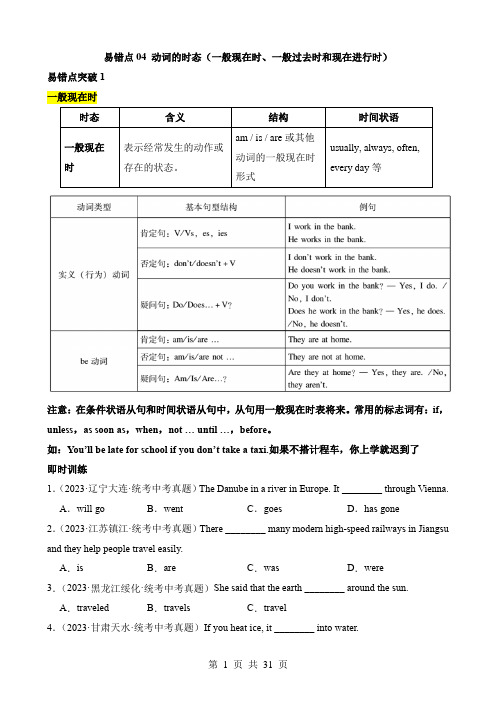
易错点04 动词的时态(一般现在时、一般过去时和现在进行时)易错点突破1一般现在时注意:在条件状语从句和时间状语从句中,从句用一般现在时表将来。
常用的标志词有:if ,unless ,as soon as ,when ,not … until …,before 。
如:You’ll be late for school if you don’t take a taxi.如果不搭计程车,你上学就迟到了 即时训练1.(2023·辽宁大连·统考中考真题)The Danube in a river in Europe. It ________ through Vienna. A .will go B .went C .goesD .has gone2.(2023·江苏镇江·统考中考真题)There ________ many modern high -speed railways in Jiangsu and they help people travel easily.A .isB .areC .wasD .were3.(2023·黑龙江绥化·统考中考真题)She said that the earth ________ around the sun. A .traveled B .travels C .travel4.(2023·甘肃天水·统考中考真题)If you heat ice, it ________ into water.A.turns B.turned C.was turning D.has turned 5.(2023·福建漳州·校联考模拟预测)Every year thousands of people ________ to the beach to relax themselves.A.went B.go C.have gone6.(2023·甘肃武威·统考模拟预测)—Sunshine Taxi Service. Can I help you?—My plane ________ off at 11:30 in the morning. Can you send a taxi no later than 9 o’clock?A.takes B.took C.has taken D.will be take 7.(2023·甘肃陇南·统考一模)David ________ with his friends every weekend.A.swims B.is swimming C.swim D.was swimming 8.(2023·河北保定·统考三模)My mother works in a high school. And all students her classes.A.love B.will love C.loved D.are loving 9.(2023·河北衡水·校联考二模)Li Hua lives a green life and __________ the waste into different groups for recycling.A.divides B.will divide C.was dividing D.divided 10.(2023·海南海口·校联考二模)—Can you tell me ________?—He lives in Shanghai.A.where Jack livedB.where does Jack liveC.where Jack lives易错点突破2一般过去时即时训练11.(2023·湖南益阳·统考中考真题)—I’ve already visited the space museum. What about you? —Me, too. I ________ there last year.A.go B.went C.have gone12.(2023·北京·统考中考真题)The Shenzhou-15 astronauts ________ to Earth safely on June 4, 2023.A.return B.returned C.will return D.have returned 13.(2023·广西·统考中考真题)Yesterday I ________ basketball with my classmates. We had a good time.A.will play B.play C.played14.(2023·黑龙江绥化·统考中考真题)— How did you get to school yesterday?— I ________ my bike to school.A.rode B.ride C.rides15.(2023·湖北武汉·统考中考真题)Jessica ________ every night before her Chinese test and got good results.A.studies B.studied C.has studied D.will study 16.(2023·四川泸州·统考中考真题)— Which teacher will you miss the most after graduation?— Mrs. Chen. She encouraged me a lot when I ________ the English exam.A.fail B.was failing C.failed D.have failed 17.(2023·安徽·校联考模拟预测)—Has your sister come back from Yunnan?—Yes. He ________ there for two months to help training teachers in the countryside.A.stays B.stayed C.has stayed D.will stay18.(2023·甘肃平凉·校考三模)—Your e-mail address again? I ________ quite catch it.-It’****************.A.can’t B.couldn’t C.don’t D.didn’t 19.(2023·湖北武汉·统考模拟预测)Kate ________ every night for a week before her math test and got a very good grade.A.studies B.has studied C.studied D.will study 20.(2023·湖北武汉·统考模拟预测)Nancy ________ every night for half a month before her big exam and got a good grade.A.studies B.studied C.has studied D.will study易错点突破3现在进行时注意:e,go,leave,arrive,begin,start,fly,move等表示位置移动的动词,常用进行时表示将来。
初中英语现在进行时易错点分析
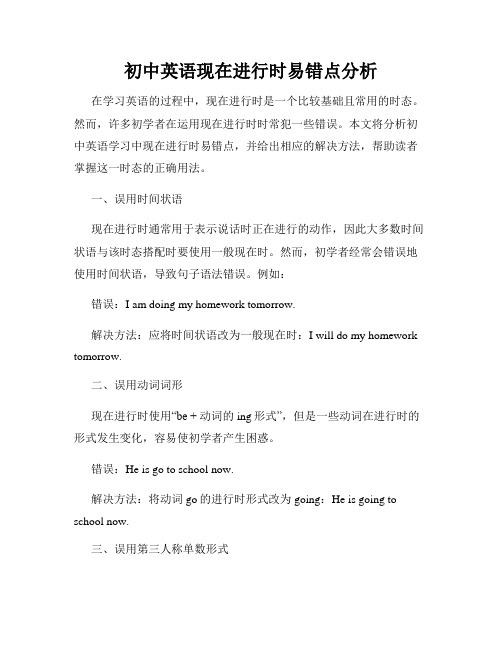
初中英语现在进行时易错点分析在学习英语的过程中,现在进行时是一个比较基础且常用的时态。
然而,许多初学者在运用现在进行时时常犯一些错误。
本文将分析初中英语学习中现在进行时易错点,并给出相应的解决方法,帮助读者掌握这一时态的正确用法。
一、误用时间状语现在进行时通常用于表示说话时正在进行的动作,因此大多数时间状语与该时态搭配时要使用一般现在时。
然而,初学者经常会错误地使用时间状语,导致句子语法错误。
例如:错误:I am doing my homework tomorrow.解决方法:应将时间状语改为一般现在时:I will do my homework tomorrow.二、误用动词词形现在进行时使用“be + 动词的ing形式”,但是一些动词在进行时的形式发生变化,容易使初学者产生困惑。
错误:He is go to school now.解决方法:将动词go的进行时形式改为going:He is going to school now.三、误用第三人称单数形式现在进行时中,第三人称单数需要在动词后加-s,但初学者常常忽略了这一规则。
错误:She is playing football every day.解决方法:将play的进行时形式plays:She is playing football every day.四、误用非行为动词现在进行时通常用于描述正在进行的动作,而非行为动词(如have、own、belong等)一般不用于进行时态。
错误:He is having a car.解决方法:将句子改为一般现在时:He has a car.五、误用表示感觉的动词有些动词用于表示感觉,例如see、hear、feel等,在现在进行时中的用法也容易出错。
错误:I am seeing a movie with my friends tonight.解决方法:将动词see改为一般现在时:I am going to see a movie with my friends tonight.六、误用状态动词状态动词表示状态,不适用进行时态。
初中英语动词 ing 考点归纳

初中英语动词ing 考点归纳Ving形式要求掌握下列十一点1. 动词Ving形式分别叫做____和______;否定式为_____;其前可加___, _____或____,做逻辑主语。
2. 动词做主语常用_____,可以带自己的______,______;副词状语有时在_______, 谓语动词用____.3. 下列动词后常接Ving形式做宾语:(30个)________4. 下列短语或句型常接Ving形式做宾语(37个)___________,介词后大多用_________.5. 下列七个动词后接Ving 与后接不定式意义不同:___________________6. 动词Ving形式表示________和________意味7. “使/令人……怎么样”类的动词ing 形式表示主语所具有的特征,一般与____或____连用,8. 感官动词后接Ving形式做宾语补足语,表该动作________,感官动词有:(8个)_________9. 常见的下面几个动词后接Ving形式做宾语补足语:(4个)_______10. when, until, before…等连词的状语从句,当_________时,它们后可接____形式,代替状语从句11. 动词Ving形式做伴随状语,一般在谓语后,用逗号隔开。
一、动词ing形式考点归纳(一)、动名词的构成和形式:1. 动名词一般由“动词+ing”构成2. 否定式构成:not +动词+ing3. 在句子中起名词作用,保留动词具有的若干特征,可以有自己的宾语和状语;eg: Learning English is important for us.Eating too much is bad for your health.4. 前面可加形容词性物主代词、名词所有格或宾格人称代词,作逻辑主语;eg: Would you mind my/me opening the door?5.动名词的时态有两种形式:A:一般式(doing) B:完成式(having done)6.动名词的被动语态形式:A:一般式被动语态( being done)B: 完成式被动语态(having been done)二、动名词的句法功能主语Eating too much is bad for your health. 吃得太多对你的健康有害说明谓语动词一律用单数形式。
八年级下册英语名现在进行时总结以及易错点含答案
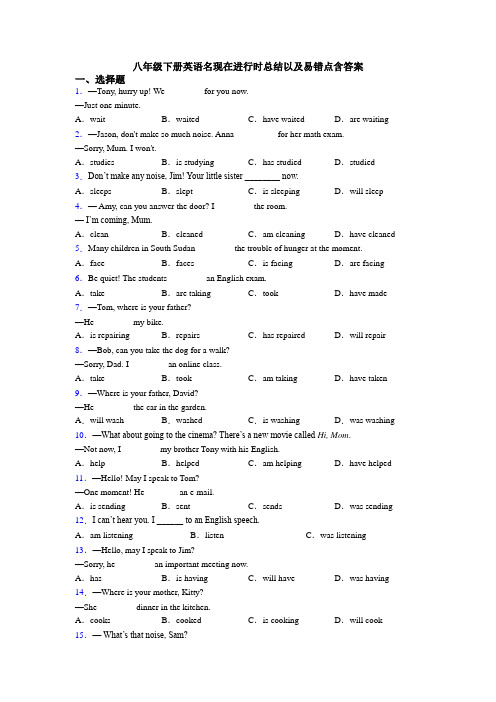
八年级下册英语名现在进行时总结以及易错点含答案一、选择题1.—Tony, hurry up! We ________ for you now.—Just one minute.A.wait B.waited C.have waited D.are waiting 2.—Jason, don't make so much noise. Anna _________ for her math exam. —Sorry, Mum. I won't.A.studies B.is studying C.has studied D.studied 3.Don’t make any noise, Jim! Your little sister ________ now.A.sleeps B.slept C.is sleeping D.will sleep 4.— Amy, can you answer the door? I ________ the room.—I’m coming, Mum.A.clean B.cleaned C.am cleaning D.have cleaned 5.Many children in South Sudan ________ the trouble of hunger at the moment. A.face B.faces C.is facing D.are facing 6.Be quiet! The students ________ an English exam.A.take B.are taking C.took D.have made 7.—Tom, where is your father?—He ________ my bike.A.is repairing B.repairs C.has repaired D.will repair 8.—Bob, can you take the dog for a walk?—Sorry, Dad. I ________ an online class.A.take B.took C.am taking D.have taken 9.—Where is your father, David?—He ________ the car in the garden.A.will wash B.washed C.is washing D.was washing 10.—What about going to the cinema? There’s a new movie called Hi, Mom.—Not now, I ________ my brother Tony with his English.A.help B.helped C.am helping D.have helped 11.—Hello! May I speak to Tom?—One moment! He _______ an e-mail.A.is sending B.sent C.sends D.was sending 12.I can’t hear you. I ______ to an English speech.A.am listening B.listen C.was listening 13.—Hello, may I speak to Jim?—Sorry, he ________ an important meeting now.A.has B.is having C.will have D.was having 14.—Where is your mother, Kitty?—She ________ dinner in the kitchen.A.cooks B.cooked C.is cooking D.will cook 15.—What’s that noise, Sam?— My little brother ________ his toy car.A.played B.is playing C.plays D.was playing 16.—May I speak to Mr. Brown?—I am sorry. He _______ an important meeting in his office at the moment.A.has B.had C.is having D.will have 17.— Where are the officers?— Look! They ________ the elephant in the palace now.A.touched B.will touch C.touch D.are touching 18.You’d better not disturb Kathy now as she ________ her speech for tomorrow’s meeting. A.is preparing B.will prepare C.was preparing D.has prepared 19.—May I use your computer?—Sorry, I ________ on it.A.work B.worked C.have worked D.am working 20.—I can't find Mike in the classroom. Where is he?—Oh, he ________ in the library.A.was studying B.studied C.is studying D.studies 21.— Hurry up, Mary. The movie has already been on for ten minutes.—Wait a moment. I ________ some snacks in a shop.A.buy B.bought C.am buying D.have bought 22.—Mom, it’s so late. Why don’t you go to bed?—Your brother hasn’t come back yet. I ________ for him.A.wait B.am waiting C.has waited D.waited 23.—Mary, let's go to the cinema. There’s a new movie called Avengers I V.—Not now, I _____________ my brother David with his math.A.help B.helped C.am helping D.have helped 24.—Where is mum?—She________in the kitchen.A.cooks B.is cooking C.will cook D.cooked 25.—What’s that noise, Mike?—My little sister ________ with her toy car now.A.plays B.played C.will play D.is playing 26.One of the firms I applied to has offered me a job but I _____ my options open until I hear from the others.A.have kept B.will have keptC.am keeping D.keep27.I _____ for the airport to catch the flight at 6 pm. Please send the file to me within ten minutes.A.am leaving B.have left C.was leaving D.had left 28.My washing machine ___________this week, so I have to wash my clothes by hand. A.was repaired B.is repairedC.is being repaired D.has been repaired29.— Hello, I ________ to ask if I can book a flight ticket to Hainan tomorrow?—Sorry, we’ve already sold out.A.phone B.will phoneC.am phoning D.have phoned30.I think we should accept that offer, for we ___________ such bad luck up till now and time ___________.A.have;is run out B.have had;is running outC.have had;is run out D.have;is running out31.Many artifacts ________ for the first time in the National Museum at present.A.were exhibited B.were being exhibitedC.are being exhibited D.are exhibited32.Social media, like WeChat, ________ the way of communication nowadays.A.are changing B.changeC.changed D.were changing33.John ______ an NBA playoff game on TV now.A.watches B.watched C.will watch D.is watching 34.Hi, Mike. I’ve to borrow your car this afternoon mine _______ in the garage.A.is repairing B.is being repairedC.has repaired D.has been repaired35.Hurry up! Mark and Carol ________ us.A.expect B.are expectingC.have expected D.will expect36.The zoo keepers is worried because the number of visitors __ smallerand smaller.A.become B.became C.is becoming D.have become 37.— May I speak to Mr. Brown?— I am sorry. He ________ an important meeting in his office now.A.has B.had C.is having D.will have 38.Professor Wang ________in our school till next Sunday.A.will have stayed B.has stayed C.is staying D.stayed 39.—Have you started writing your report?—Not yet. I _______ a hard time getting the information.A.am having B.hadC.was having D.will have40.—Darling, the headache ________ me.— No wonder, you _________ the South Korean TV soaps since last night.A.kills; have watchedB.is killing; have been watchingC.is going to kill; were watchingD.was killing; had watched41.The water supply has been cut off temporarily because the workers the main pipe.A.repair B.repairedC.have repaired D.are repairing42.They won’t buy any new clothes because they ________ money to buy a new car. A.save B.were saving C.have saved D.are saving 43.------ What’s wr ong with you, Kate?------ The shoes don’t fit me properly. They_____ my feet.A.have hurt B.are hurting C.had hurt D.are hurt44.A recent survey shows the number of people who shop in stores________,while far more are shopping online.A.decrease B.decreases C.is decreasing D.are decreasing 45.—Joan,what ________ in your hand?—Look!It's a birthday gift for my grandma.A.had you held B.are you holdingC.do you hold D.will you hold46.I don’t really work here; I ______ until the new secretary arrives.A.just help out B.have just helped outC.am just helping out D.will just help out47.—Mary, may I use your ipad for an hour?—Sorry. I ________ on it.A.work B.am working C.have worked D.worked 48.—Has your aunt finished writing her novel?—Not yet. She ________ it these days.A.wrote B.writes C.is writing D.will write 49.—What is your mother doing, Linda?—She ________ dinner in the kitchen now.A.is cooking B.was cooking C.cooks D.cooking50.--- Joan, what_________in your hand?--- Look! It's a birthday gift for my grandmother.A.had you held B.are you holding C.do you hold D.will you hold 【参考答案】***试卷处理标记,请不要删除一、选择题1.D解析:D【详解】句意:——托尼,快点!我们现在在等你。
- 1、下载文档前请自行甄别文档内容的完整性,平台不提供额外的编辑、内容补充、找答案等附加服务。
- 2、"仅部分预览"的文档,不可在线预览部分如存在完整性等问题,可反馈申请退款(可完整预览的文档不适用该条件!)。
- 3、如文档侵犯您的权益,请联系客服反馈,我们会尽快为您处理(人工客服工作时间:9:00-18:30)。
【初中英语语法时态】动词—ing形式易错点集锦
1.因为习惯于在各种各样的地方驾车,他真是一个有经验的司机。
误:Used to drive the car in all kinds of places, he is really an experienced driver.
正:Used to driving the car in all kinds of places, he is really an experienced driver. 析:句中的used to来自be used to,表示“习惯于做某事”的意思,to为介词,后面应接动词—ing形式作宾语。
Look forward to(渴望),get /become used to(习惯于做某事), stick to(坚持),get down to(着手),devote...to…(把…专用于…)等短语中的to 为介词,其后均应接动词—ing形式作宾语。
2.我建议你穿上大衣,因为外面很冷。
误:I suggest you to put on your overcoat, because it is very cold outside.
正:I suggest your putting on your overcoat, because it is very cold outside.
析:suggest, include, consider, finish, miss, avoid, risk, mind, stand, escape等动词后面只能接动词—ing形式作宾语。
your是putting on的逻辑主语。
3.因为很忙,他们不得不再次推迟结婚日期。
误:Being very busy, they have to put off to get married once again.
正:Being very busy, they have to put off getting married once again.
析:put off, excuse…for…, can’t help(忍不住…), insist on, keep on, give up, feel like 等动词后面只能接动词—ing形式作宾语,不能接动词不定式作宾语。
4.如果不给我说一声,你就不能去爬那座山。
误:You can’t go to climb that mountain without tell me.
正:You can’t go to climb that mountain without telling me.
析:without为介词,后面只能接名词或动词—ing形式作宾语。
5.如果你想知道主人是否在家,可以试着敲一下门。
误:If you want to know whether the host is at home, you can try to knock at the door.
正:If you want to know whether the host is at home, you can try knocking at the door. 析:try to do sth意为“尽力,努力去做某事”,而try doing sth意为“试着做某事”。
go on(继续做),stop(停止),mean(意味着),remember(记得),forget(忘了),consider(考虑)等动词后面常接动词—ing形式作宾语。
6.我真的认为只阅读不思考这些语言点是没有用的。
误:I really think that it is no use to read without considering these language points. 正:I really think that it is no use reading without considering these language points. 析:在“it is no use/no good/useless doing sth”句式中,it为形式主语,后面的动词—ing形式作真正的主语。
7.在读这本动人的小说时候,这个中年妇女流下了眼泪。
误:Reading this moving story, tears came to the middle-aged woman’s eyes.
正:Reading this moving story, the middle-aged woman burst into tears.
析:动词—ing形式作状语时,其逻辑主语应为主句的主语,因此做题时,应注意动词—ing的逻辑主语与主句的主语是否一致。
8.因为通过了这次重要而又艰难的考试,玛丽感到非常高兴。
误:Passing the important but difficult examination, Mary felt very happy.
正:Having passed the important but difficult examination, Mary felt very happy.
析:通过分析语境可知,这一次重要而又艰难的考试的动作发生在Mary感到非常高兴的动作之前,因此此处应用动词—ing形式的完成式。
使用动词—ing形式作状语时,应分析动词—ing所表示的动作与谓语动词所表示的动作发生的时间有无先后之分,以确定是用动词—ing形式的一般式还是完成式。
